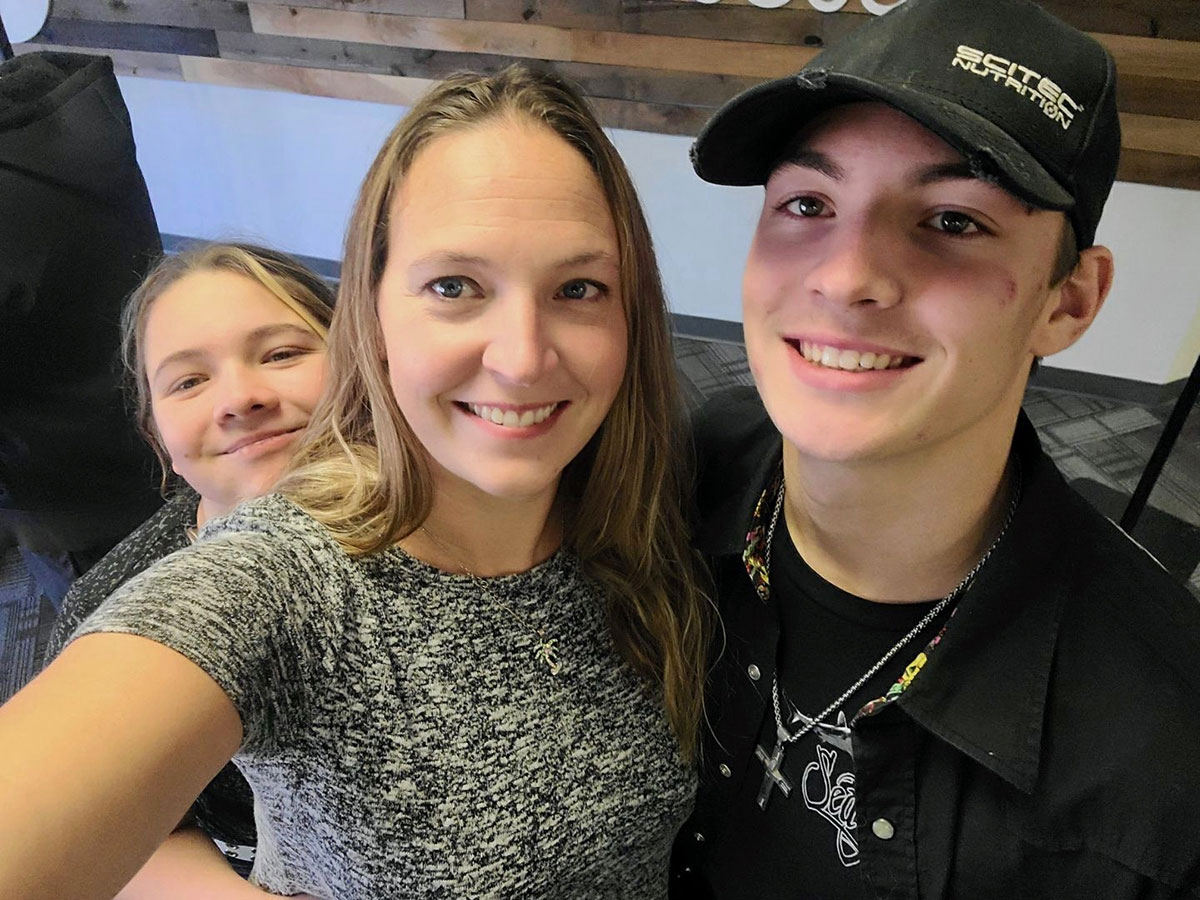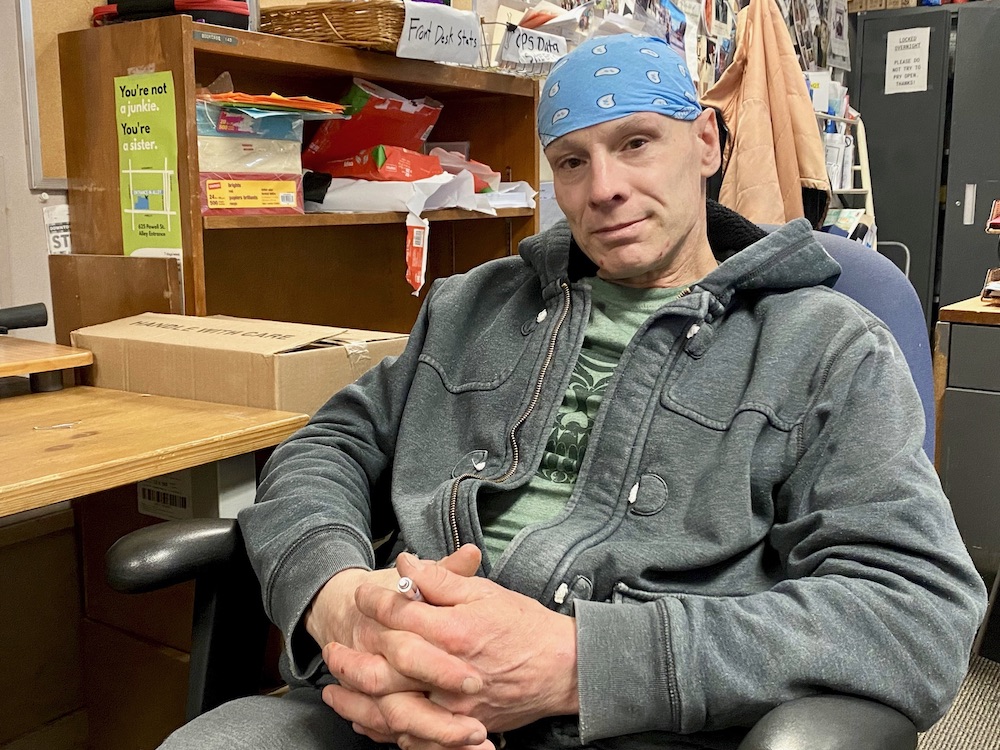[Editor’s note: A video included in this story includes disturbing images of a police car hitting a pedestrian in a crash that left him with serious injuries, and contains vivid descriptions of body trauma. Please read cautiously and watch the videos at your own discretion.]
Six months after he was hit by a police car on East Hastings Street, Dennis Hunter is still struggling with pain, vision problems and difficulty walking.
“I woke up on the hospital table with the doctor and the nurse talking about detaching the retina and building up the bone behind the eye,” Hunter told The Tyee.
“My legs aren’t healing, they’re all swollen 24-7. The eye socket behind my eye was fractured and crushed, and now I see tracers and ‘spiders’ in that eye.”
Hunter, his family and Downtown Eastside community members say they’re still waiting for answers about the horrific collision last September and the behaviour of police officers after the crash.
The 51-year-old former ironworker was hit on a stretch of Hastings Street where the speed limit was set to 30 kilometres an hour over a decade ago. The busy five-lane street cuts straight through the heart of the Vancouver’s Downtown Eastside, where homelessness and drug use are common and pedestrian crossings can be unpredictable.
Three health-care workers who attempted to help Hunter say police officers who arrived on the scene aggressively interfered with the first aid they were attempting to give him.
People supporting Hunter have struggled to help him get adequate medical care and housing after he was seriously injured.
“I feel like he's not getting care because everything is being written off as addiction rather than trauma from this incident,” Rhonda Simpkins, Hunter’s former partner, told The Tyee.
“You're living in constant pain and you're not getting medical care. What are you supposed to do?”
One September evening at Hastings and Main
Hunter doesn’t remember the collision. He only learned how hard he’d been hit, and that the driver was a police officer, when he struck up a conversation with Scott Gilbert after being released from the hospital. Gilbert used to manage a building on East Hastings and installed several surveillance cameras with the help of local businesses to try to improve safety in the area.
Gilbert’s videos from the early morning hours of Sept. 20 show Hunter standing hunched over and motionless in the left lane of East Hastings Street for several seconds. Then, at 3:21 a.m., he’s suddenly hit head-on by a Vancouver police car, which did not have any lights or sirens on at the time of the collision.
The vehicle hit Hunter with so much force that his shoes flew off his feet. He was tossed into the air, flipping over once, before skidding along the road surface and landing two metres from the vehicle, crumpled and unmoving.
[Content warning: This video shows a police car hitting a pedestrian, who survived the collision. Viewer discretion is advised.]
Hunter was left with a fractured leg, road rash on the other leg that led to a serious infection, and injuries to his head and face that include fractured sinuses and the broken eye socket. While he got treatment at St. Paul’s Hospital immediately after the collision, he says he was released just three days later without fully knowing how bad his injuries were.
Later, he was readmitted to hospital and treated for a serious infection in one leg.
Simpkins has been advocating for Hunter from her home in Saskatchewan ever since he called her about a week after the collision. Simpkins and Hunter married in 2007 and had two children together; while they’re now separated, Simpkins describes them as “best friends.”

Simpkins breaks down in tears as she recalls how, busy planning a family trip and not realizing how serious the collision had been, she gave her phone to her and Hunter’s 14-year-old son and 11-year-old daughter to get more information about the incident.
“They watched that video before I did,” Simpkins said. “It’s traumatic if you don’t know the person. But if that person is the dad to your children, it’s a little different.”
Hunter said he is now afraid of the police and uneasy about living in the Downtown Eastside. He said he would like some compensation for his injuries and an apology from the VPD.
“I don't even know who hit me,” he said. “I would just like a face to face with them.”
While B.C.’s recent switch to no-fault insurance limits the amount of compensation for collision victims, Vince Tao, a community organizer with the Vancouver Area Network of Drug Users, said he plans to help Hunter make a claim with ICBC, B.C.’s auto insurer.
Police interfered with first aid, nurse says
Gilbert and Simpkins want to know how police, who are responsible for enforcing traffic laws, could have mowed a man down in a well-lit area where the speed is supposed to be just 30 kilometres per hour.
After watching the video, Gilbert, Simpkins and Hunter all believe the car was travelling at a much higher speed.
But Simpkins also has questions about how police treated three health-care workers who rushed to Hunter’s side as he lay on the pavement.
A registered nurse and two other health-care workers sent statements to the Vancouver Area Network of Drug Users, which VANDU has shared with The Tyee. The Tyee has verified the identity of the workers, but is keeping them anonymous because of potential employment repercussions.
In her statement, the nurse said she and her two colleagues were leaving their workplace when they saw the collision and immediately went to help. They identified themselves to the two officers who had been in the vehicle that hit Hunter and the nurse began to assess him. She wrote that he was unresponsive, bleeding profusely and breathing irregularly.
The nurse wrote that additional police cars then arrived on the scene, “nearly hitting” bystanders. Six more officers “proceeded to interfere with first-aid efforts by myself and other first responders” by yelling at them, pushing one of her co-workers to the pavement and holding weapons.
“At one point I actually turned and also yelled at officers to stop, only to witness them push my co-worker to the pavement, which broke part of our crash kit in the process,” the nurse wrote, noting that paramedics and firefighters had not yet arrived.
She said she identified herself as a registered nurse numerous times to the officers and was finally allowed to continue helping Hunter, although police continued to “use undue force on other first responders and bystanders.”
As the man was being transferred to the ambulance, the nurse wrote, she attempted to place his shoes and hat in the ambulance with him and was chastised by police who told her she was “interfering with evidence.”
In a press conference on Sept. 23, Vancouver Police Department media liaison officer Sgt. Steve Addison told news media that “as our officers were securing the scene, because it was a collision scene, there were a number of people who did encroach upon the officers and this is a very common thing that happens on the Downtown Eastside.”
In an email response to The Tyee for this story, Addison wrote that “any time someone is struck by a vehicle, the location of personal items, such as footwear, becomes key evidence that often shows where they were standing when they were struck. Anyone entering a collision scene to move or remove items is interfering with an investigation.”
In a followup interview, the nurse called Addison’s response “ridiculous.”
“They were obstructing my duties as a nurse,” she said. “Even if that’s right, it’s the way they went about it that I objected to.”
During the Sept. 23 press conference, Addison also said that police officers can use their laptop while doing patrols and are exempt from B.C.’s distracted driving prohibitions on using devices while driving.
Because the collision is being investigated by the Independent Investigations Office, Addison declined to comment on Hunter’s request for an apology or the health-care workers’ account of being harassed while trying to provide first aid. The police officer who was driving the car at the time of the collision remains on active duty, Addison said.
The IIO investigates all police interactions that lead to death or serious harm. The agency declined to provide any information to The Tyee about how long the investigation will take.
Gilbert said he is not anti-police — he works with police all the time when they want video of that stretch of Hastings Street.
But he said he wants to see some accountability from the VPD, who should be well aware that people in the neighbourhood are often walking in the roadway. He questioned how the public would react if the same thing had happened in a school zone, where the speed limit is also 30 kilometres per hour.
“People are in that intersection all the time,” he said. “A police officer who knows about this area should have been more cautious.” ![]()
Read more: Rights + Justice, Municipal Politics

















Tyee Commenting Guidelines
Comments that violate guidelines risk being deleted, and violations may result in a temporary or permanent user ban. Maintain the spirit of good conversation to stay in the discussion and be patient with moderators. Comments are reviewed regularly but not in real time.
Do:
Do not: